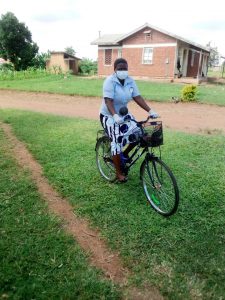Lifelines in a Global Pandemic
COVID-19 lockdowns have turned all of our worlds upside-down, but arguably the biggest impact on the African continent has been in rural communities. Livelihoods have been destroyed, and access to health services has become near-impossible. In this week’s update, m2m President & CEO, Frank Beadle de Palomo, sheds some light on the realities, and how mothers2mothers (m2m) is using our experience and reach to be a lifeline for our clients.
“Many of my clients are not making it to the health centre for their appointments or to pick up their HIV treatment because transportation has been stopped during the national lockdown. It is too difficult for them to walk long distances to the nearest health centre with babies on their backs and empty stomachs,” says Teddy Atim, a Mentor Mother employed by m2m in Siahooli, a rural village in Uganda near the Kenyan border.
Life under lockdown
For the last seven weeks, life across Uganda has ground to a halt, creating extreme hardships for many, particularly in rural areas where more than three-quarters of the population lives, according to the World Bank. The country has taken one of the most aggressive approaches in the region to stop the spread of COVID-19. Uganda has experience facing down deadly outbreaks, including the Ebola (in 2019 and 2000) and Marburg (2017) viruses. After its first COVID-19 cases were confirmed in late March, Ugandan President Yoweri Museveni closed international borders, instituted a dusk-to-dawn curfew, and shut down all but essential businesses. Families in Teddy’s community are no longer permitted to fish in nearby Lake Bukaana, which is their primary source of income.
The government also halted almost all private and public road transportation, including motorcycle taxis called boda bodas and three-wheeled tuk-tuks, that many Ugandans rely on to move around their communities. In Teddy’s community, people now have to walk up to three hours to reach the nearest health centre.
Community lifelines

Teddy Atim travelling to reach her clients in the community.
Mentor Mothers have sprung into action to become lifelines for their communities. Designated as “essential workers” under lockdown, they are exempt from the travel ban. They are putting on personal protective equipment and using m2m vehicles, motorcycles, and bicycles to reach clients that they are unable to contact by phone—making sure women and families are informed about COVID-19 and the increased risks it poses for those living with HIV, and supporting them to access the health services they need. With approval from local authorities, Mentor Mothers have been given permission to deliver antiretroviral (ARV) medication to clients living with HIV who are unable to complete refills at the clinic. In some cases, Mentor Mothers are even bringing women in labour to the health facility for delivery, which reduces the risk a baby will contract HIV.
The efforts of these brave women are a matter of life and death. According to World Health Organization (WHO) and UNAIDS estimates released last week, a six-month disruption of ARV medication could lead to more than a half a million additional deaths from AIDS-related illnesses over the next year, turning back global progress by 12 years. Furthermore, WHO and UNAIDS warn that disrupted HIV services could lead to a significant increase in mother-to-child transmission of HIV—by as much as 104% in Uganda.
Furthermore, UN Women reports gender-based violence (GBV) is likely to rise due to the economic and emotional strains and pressures created by COVID-19. Teddy says she has seen this already in her community, with men unable to support their families by fishing.
“Mentor Mothers talk to husbands and wives on how to manage this stressful situation. We talk to men about respecting their wives, and help women understand why their husbands are not able to support their family. When necessary, we refer them to local GBV counselors for more support,” Teddy says.
While life in Uganda is very difficult with COVID-19, Teddy says Mentor Mothers are helping women and families through the crisis: “In the beginning, people were very scared. But the information and support Mentor Mothers are giving their clients on COVID-19 and HIV has helped to reduce their fears. Just like with HIV, Mentor Mothers are leading by example, showing people how they can protect themselves and stay safe and healthy. That is bringing hope to women and families in my community and the other communities we serve.”






















